My mom told me that after we moved from our home in rural Missouri to a cramped rambler in the Minneapolis suburbs with her family, that when she tucked me in at night, I would try to make her promise me that she wouldn’t die in her sleep.
She wouldn’t do it. She wouldn’t promise me that because she had no way of knowing whether or not it would happen, and she wouldn't make a promise she couldn't be sure she could keep. In the incredibly unlikely event my fear came true, she didn’t want me to grow up thinking my dead mother was a liar, someone who broke promises, maybe even died overnight on purpose to spite me.
I begged, pleaded with her to just promise, just make me that little promise so I could go to sleep. She wouldn’t, ever.
I was always afraid of death: everything was a catastrophe or one in the making, I was wracked with existential terror for no real reason at all, always looking over my shoulder, always wondering when I might just drop dead for no other reason than accidentally making God angry or something. It was the time of sensationalist TV talk shows and they kept me in a steady diet of all things new and old to be afraid of: AIDS, tuberculosis, cancer, glaucoma, hurricanes, bullies, tornadoes, hell, earthquakes, aliens, David Bowie, biblical Armageddon.
The fears evolved and shifted, some gaining more prominence over others depending on the circumstances of the season, but it wasn’t just myself I was afraid of losing to the unknown, the dirt, the sky, whatever place I thought or hoped we went after that inevitable end — it was her, my mom, especially. The reasons are obvious now, of course; I remember a fair amount of my first three years in Missouri and immediately after coming to Minnesota, but nothing from the move itself. The move, and the circumstances that preceded it, were abrupt and, I am sure, traumatic for a child of any age, and my mother in her condition, heavily pregnant with my little sister.
My dreams always have the backdrop of imminent doom, no matter how otherwise pleasant, and have for as long as I can remember. I don’t know that I’d call them nightmares; that’s just their vibe. This is around the time I started remembering them.
My sister was born and we moved a few more times over the years, first to an apartment up in Northwestern Minnesota that had a chicken pot pie waiting for us in the oven of the dimly-lit kitchen when we arrived late one snowy night, which were the weather conditions under which we seemed to arrive everywhere during this period of my life. We stayed a few months, not too long, just long enough to endure a harsh Northwestern Minnesota winter with what we dubbed the “Wicked Wind,” the wintery plains’ howling nighttime gusts that whistled through every crack in the window or wall. I hid from the sound in the bathroom, lying curled on the floor, face to the rug, covered in a towel as my blanket. It was the only room without windows.
We moved to Minneapolis next, staying with more family, Grandpa and another aunt, one of my mom’s three older sisters. We would stay there for a few years while my mom got a degree and a job and then a house of our own, just a mile or two away, the final house I can say I grew up in. It was a few blocks from the high school I’d later attend, which was across the street from a cemetery, which — of course — scared me. I looked out of my attic bedroom window one night that first summer we lived there and saw the glow of the high school’s stadium lights coming from the direction where I knew the cemetery to be and was afraid, thinking they were the lights of a UFO sent to that cemetery, to use as a sort of base, to start rounding up the humans of my little neighborhood, one by one. I was sure of it.
I was seven when I went to Arizona for the first time to visit my dad, one stop included on a longer, epic road trip with Grandma and Papa, one that Papa wanted to take with me because he was dying and it would be the last time he could. He’d taken my cousins, his older grandsons, on camping trips and wanted to have the experience with his granddaughter, and for me to have that memory with him. I didn’t know he was dying then and wouldn’t find out until he did die several months later, so I was excited for this trip and its many side quests, being chosen to come along for the adventure, culminating in the acquisition of a family heirloom located in Victorville, California: an old grandfather clock that had been in Papa’s family for generations. We went to Wyoming first, to Jackson Hole, and we camped in the RV in what I remember to this day to be the most beautiful natural place I’ve ever seen, the wooded mountains we nestled into next to an ice-cold stream of clear running water that Grandma would use to cook with and wash my hair.
Papa trusted my mom with the secret of his illness, his former daughter-in-law who’d taken on the role of single motherhood because his son wasn’t up the the task of doing his part. They loved her and helped us financially when they could and made sure we spent time with them since their son wasn't there to help facilitate it. Too young to take care of the family he created, too tied down for his own good, lured away by the temptation of Brenda, the atheist vegetarian writer in Arizona with cages full of pet birds and a penchant for horseback riding and Stephen King novels. Intellectually and artistically seductive, if in no other way, as the woman's utter lack of physical attractiveness or even pleasantness were quiet but open agreements amongst family, but you couldn't deny her wicked intelligence.
Sometimes I imagine being Papa on this trip, soaking in what only he and his wife and his former daughter-in-law knew at the time to be probably his last camping trip on this beautiful land he grew up on and around, waiting for the sickness in his lungs to eventually take him, something he’d accepted quietly, with grace and discretion, because he didn’t want to leave his family in debt and, being a spiritual man and a Christian Scientist, believed perhaps prayer could help, instead. Family lore says this was beginning to work, if not for external stress that caused the heart attack to kill him before the cancer could.
How do you enjoy anything knowing that’s what the future holds? How does anyone? I wondered for a long time, the knowing, and the living despite it.
After the camping trip, we headed down to Arizona to see my dad and meet Brenda. This was supposed to be a surprise for me, but someone let the cat out of the bag early, and I was instructed to act surprised, and I was preoccupied with making sure I was convincing, though I cannot remember if I was when Grandma finally told me on our last day in Wyoming inside of one of those Western supply stores full of belt buckles and boots and leather fringe. I was, however, extremely excited, and extremely nervous, to see my dad. He had become mythical to me in the years since I’d last seen him.
I think I’ve only been to Arizona maybe twice: this trip, and another driving through it to get to Southern California some years later, but it still feels like more. Something about the state’s familiar landscape, maybe my memories borrowed and merged with images from those yearly calendars, each month a tribute to the beautiful geography of one or another of the country’s states, the memories driving down the highway, a picturesque, empty road ahead of us, carved into red canyon rock, sitting on the truck’s bench seat between Grandma in the passenger seat and Papa driving, coloring in my coloring book and explaining to them how I stay in the lines so good, how it’s because I outline the shapes first and the wax acts like a bumper to keep the color in, see? Grandma and Papa laughed at me and I couldn’t figure out why. Didn’t they teach this technique when they were in school? I kept coloring.
Dad’s house that he shared with Brenda in the Phoenix suburbs was normal, bigger than ours in the city, a typical suburban layout, decorated in exactly the way I imagined a vegetarian hippie obsessed with horses might decorate her house, and that’s good because that’s what Brenda was, that’s who my dad blew up his previous life for.
The yards in this part of Arizona weren’t “yards” as I’d come to know them, but patches of dirty-looking sand surrounding the house, some scraggly brush here and there, a dead cactus lying on its side in front of the house, a pool in the backyard to match those in every other backyard in the neighborhood, coming standard with each home; I could only assume this was the case, anyway, by their sheer ubiquity. And horses, those seemed to come standard, too, but my dad always had horses and would always find a way to keep at least one somewhere, even in a suburban cul-de-sac.
We stayed there at my dad’s new place for a few days and I rode the horse and made crafts with Brenda. We decorated horseshoes, of which they seemed to have a never-ending supply, with raw wool and pieces of ornate metal and other trinkets and symbols she told me were important, and she explained her vegetarianism and animal rights beliefs to me. She’d converted my dad to vegetarianism and he didn’t watch football or drink alcohol anymore. He looked skinny to me, but maybe he was always skinny back then.
They had a large fish tank, more like an aquarium, something that seemed excessive but in a way I could brag about to impress other kids later: “My dad has a giant fish tank. I went to my dad’s house and saw it.” Being able to say my dad, someone who existed in the present tense, like it was just a normal part of life, showing that hey, I have one of those, too. That felt exciting, important. I filed it away to store with the handful of other memories I could pull out when I needed a dad story.
I remember how luxurious the central air conditioning, not really necessary in Minnesota back then, felt after being outside in the most oppressive heat I’d ever experienced in my life so far.
The stars seemed bigger there, somehow. It was the suburban desert, but it was still the desert, and I remember the night sky felt like it belonged to another planet, butted up against a harsh landscape that provided nothing, with the house aquarium feeling incorrect but brave, and the reverse climate control concerns and the animals. It was like a window to the parallel universe where my dad wanted us, my sister and I, to have that life with him. It felt almost like it could be my real life, like maybe I could travel there sometimes, like lucid dreaming before I knew what lucid dreaming was.
I didn’t want Brenda as a stepmom; she fit the “evil stepmother” stereotype most of the time when she didn’t spontaneously come out with crafts and haughty hippie life lessons once in a blue moon. The life, though, at least sometimes, now that could be cool. Who could I be down there, over there, in Arizona? I went home with a pile of horseshoes that I would slowly decorate with hot glue and whatever I found outside, with Brenda’s rules and tips in mind. I imagined myself a real Western Girl.
I would never visit them there again.
Papa died when I was eight, the winter following that last camping trip with him. We drove down to rural Missouri for the funeral. It was snowing all night, the whole six hour drive down, and the single-wide trailer Grandma and Papa lived in was crowded with family, most of whom I didn’t recognize. Dad had come up for it, Papa being his father. My little sister was barely a toddler, being held by my mom at her hip; Dad hadn’t met her yet because he left when she was pregnant with her.
“Daddy! Look! Look! It’s my sister! She’s born now! Daddy!! Look at her!”
I was waved away, my childish interruptions annoying my parents, whom I hadn't seen together in years, trying to have a serious conversation for the first time in just as long.
I imagined often what my life would have been like in Missouri, too, in the alternate timeline where my parents stayed together and we didn’t move to a northern city, or him to the western desert.
It was usually an exercise in imagining the worst life possible for myself, especially as I got old enough to become a snob about being from the city instead of the country.
My sister and I were probably unusually outdoorsy for “city kids” in that, beyond the usual bike-riding around the neighborhood at all hours of the day and night that you’d expect from urban and suburban kids in the nineties, we also had a lot of natural, woodsy areas and lakes nearby, plenty of parks and hiking trails, and kids were still allowed outside by themselves. We, like the country kids, could go play in the woods, bike down to the river, make a fort by the creek, build an illicit fire somewhere remote enough, even set up tents and camp in each other's yards. We had infrastructure close by which lent a security that I did not take with me into the vast emptiness of the Northwestern Missouri fields every summer when we’d visit.
The relief I felt leaving the eerie, desolate farmlands of Northwestern Missouri was palpable every summer, away from the wide-open death potential I saw everywhere and back into civilization.
I always preferred the city.
My dad moved a few more times, again in 2012. My sister and I hadn’t been in contact with him for many years, not until that year right around Valentine’s Day when Grandma died and we drove down to Missouri in an ice storm and saw him at the wake. He came up to us, gave us gas money, hugged us and said it was good to see us. We left later, bewildered, our father’s money in my sister’s wallet, his phone number in both of our phones, text messages with him next to those from our mom. Is that what it felt like to have parents, plural? Seeing both “Mom” and “Dad” in your text history, after all this time? I was twenty-nine.
He met someone new, a woman he said was “not too far in age” from the two of us, who helped him understand the importance of reconnecting with us, and her insistence, as a woman whose own father ran off in a similar fashion when she was a child, that he try to repair the mistakes he’d made.
Now he, with his wife and young stepson and stepdaughter and more dogs and other pet creatures than I can count, live in the middle of nowhere again, close to the middle of nowhere that I visited during all those summers throughout my childhood.
I’m not afraid of it anymore.
It’s another home, now, where I feel comfortable.
No one lives in the house where I grew up. No one in my family, that is. My mom and sister live in the suburbs now, within walking distance of each other, and while my mom’s will always be “home” to me no matter where it is, my sister is the one with the house that has become the default gathering place, where I can rummage around the fridge without asking and borrow a random pair of shoes by the door that will always fit me. The house where the kids’ friends gather because it’s fun and safe and welcoming, just like our house was to our friends when we were kids.
I live in Virginia, because I’m like my dad in that I just had to go. I always just have to go. And the opportunity struck, so I left.
They say you can never go back home and maybe they’re right, but I’m not so sure. It's true: people move on after you leave. Life happens to everyone else, too. Other people move away and you have fewer people to visit when you go back, fewer connections to the neighborhoods that shaped you, fewer reasons to go to certain places, for excuses to reminisce. People get used to your absence, they have kids, buy houses, quit drinking, come out, start businesses, and you’re not integrated anymore. You’re no one’s de facto Auntie or Uncle, not really, not like the friends and family who stayed.
But the smells, they stay the same. The windy plains and heavy air of Northwestern Missouri and the old, weathered barns falling down on the side of the road, the lingering odor of raw sewage in the more rural, underdeveloped parts as it mixes with the clay and the sticky summer air, curiously less unpleasant than it sounds. The crisp, pine-filtered oxygen of Northern Minnesota and the hot concrete scent emanating from the sidewalks of Minneapolis. The thick river silt permeating the air throughout Central Virginia, the way you can almost taste the foliage surrounding you, carried in droplets of unbearably moist air. The houses here, their ancient, saturated scents reminding you that they have seen entire revolutions. The way the forests near the nation’s capital carry the perfumed breeze of the flora they contain. The houses in Minneapolis, their distinct post-war aura that exists only there, not even across the river in Saint Paul, whose houses smell entirely different, who have completely different inner histories than those just to the west.
The smell of soil, though, the rich scent of earth, is no longer so scary. It reminds me of home now. Anywhere that is.
Quick note to readers: the summer sale is still on! You can become a paid subscriber for the completely ridiculously low annual price of only $25! Click the button below and have access to the complete archive, future paywalled posts, and the new Morality Monday column:


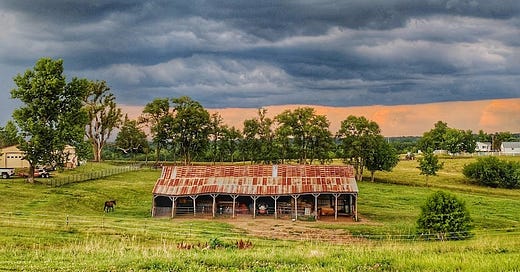




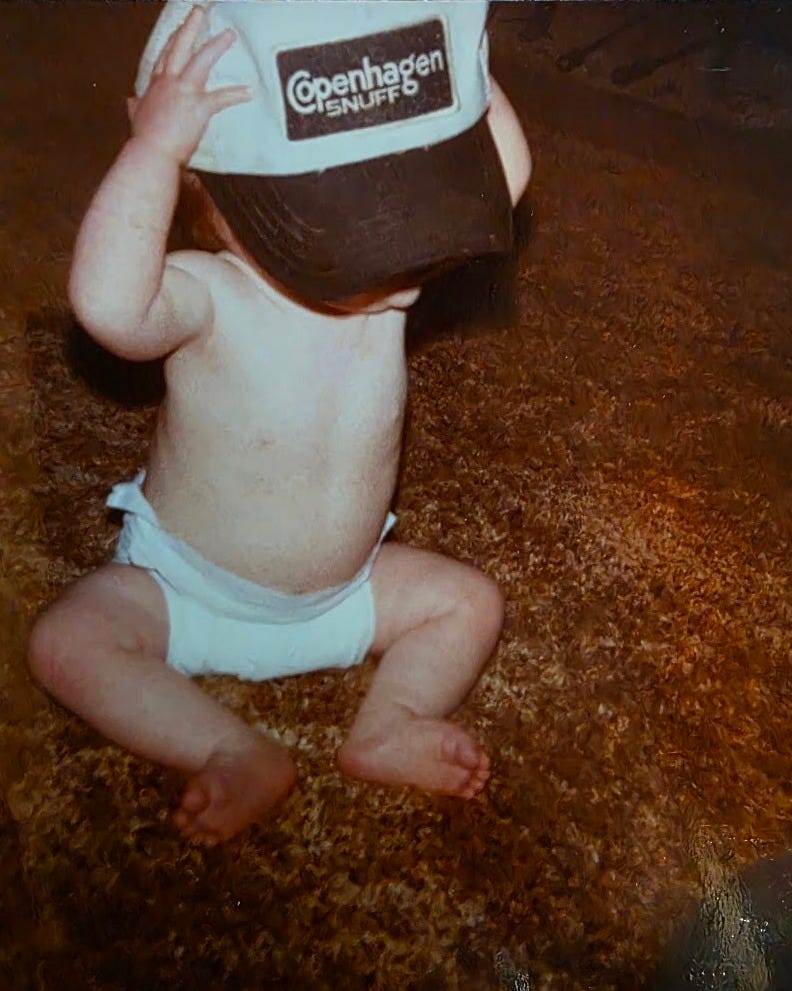
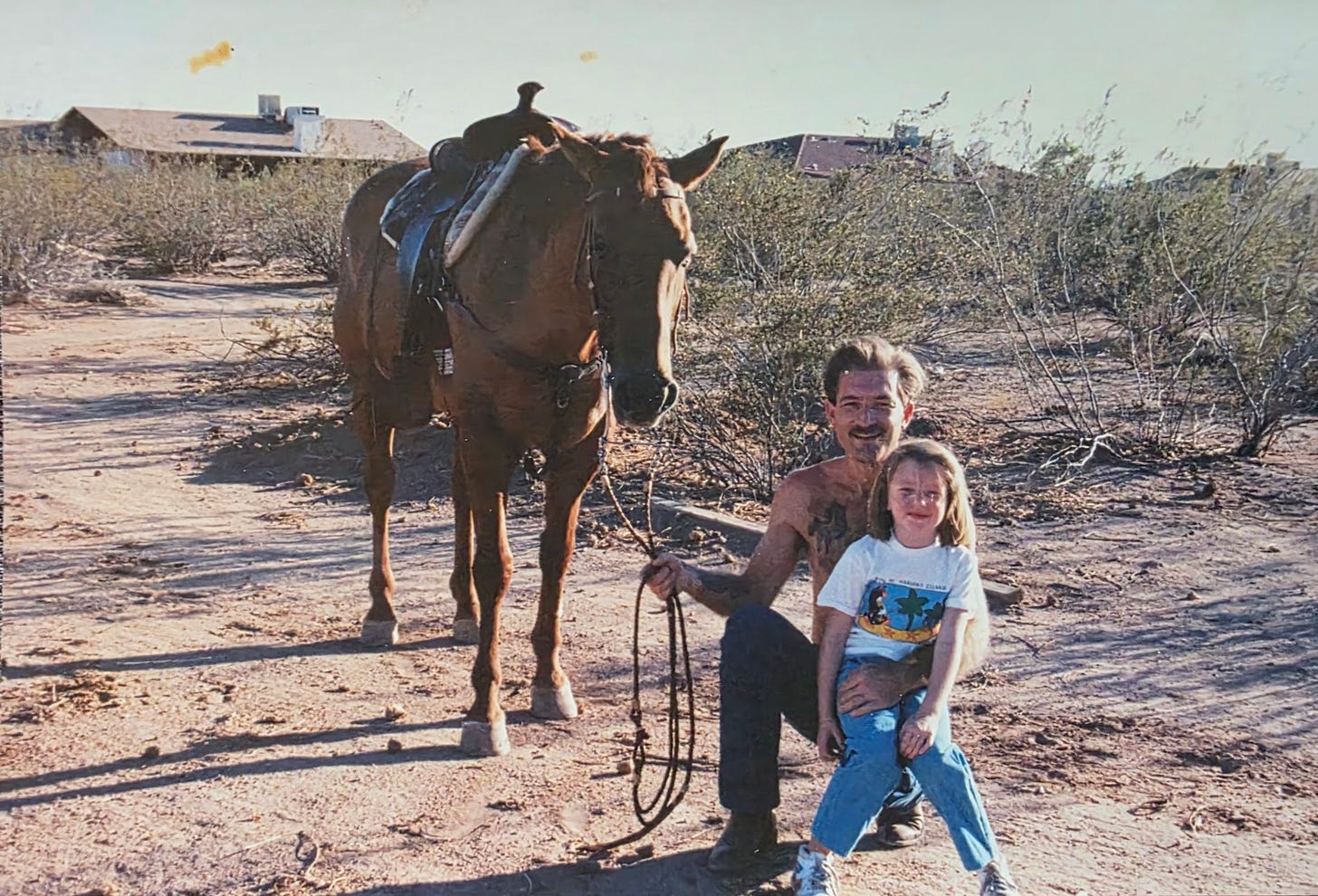
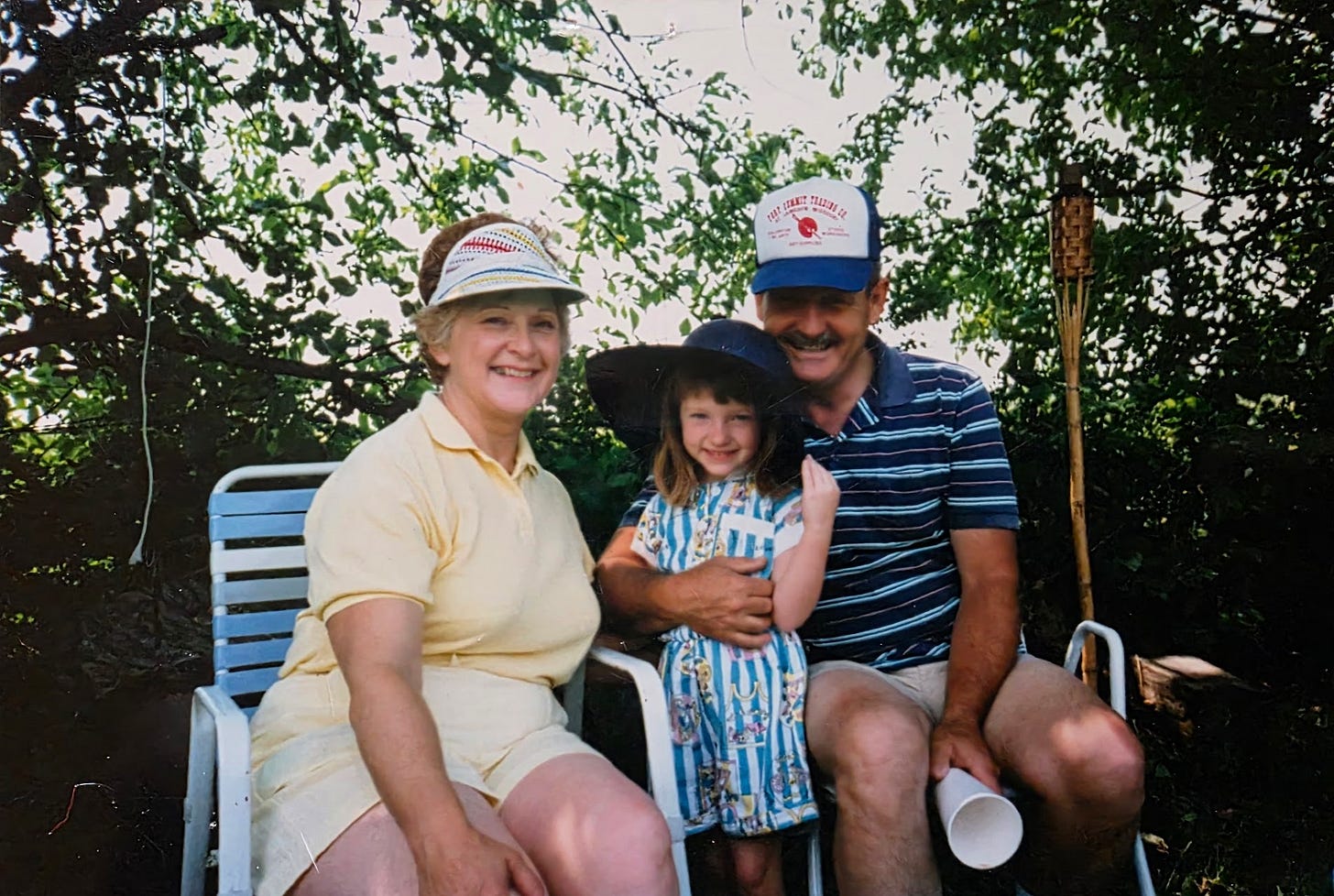


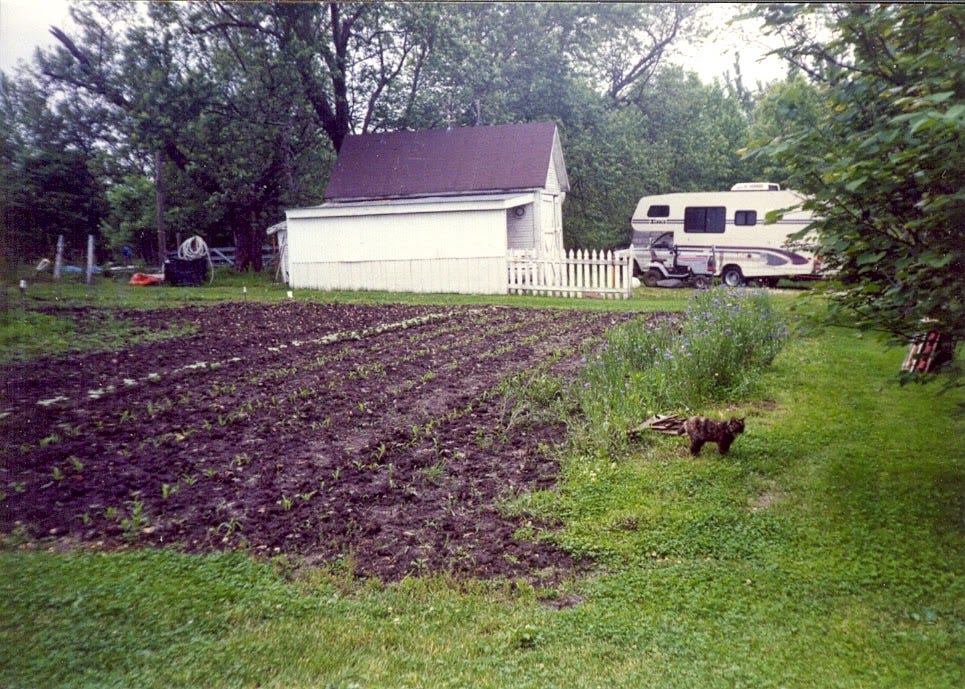
Beautiful.
I feel somewhat guilty and disloyal for approving of Brenda's vegetarianism & animal rights stances, but i must. (Coz like, me too!)
Your childhood sounds fantastic and aforable despite all the badness; once you get old enough to write your memoir combining all these memories & what comes next count me as a presale.
Was also raised by my grandparents and called them my mom and dad, & my grandfather also died of a heart attack while dealing with lung cancer (black lung in his case, forner coal miner). I was either 10 or 11. My parents got divorced when I was less than a year old, my mom got custody, then ran away from home and completely disappeared for a few years because she felt smothered. (To be fair, while I loved Mom - my grandmother - dearly, and have had an at best distant and mostly downright hostile relationship with my bio mom (her choice on that hostility, not mine, i tried until i gave up trying & was like fuck you too bitca), I completely understand why she did this and sympathize immensely, & i was almost certainly better off left behind).
LOL Victorville! I live about 2 hrs or so from there and my work home base is as bordering town. Or city. You might be shocked at how populated that area is now if you haven't seen it in a few decades.
Like your dad, we prefer living in the middle of nowhere, except we're much closer to it; dirt roads, nearest neighbor a quarter of a mile away, next nearest half a mile, over a mile in the other 2 directions. We'd prefer to be much more isolated than we are, no suburbs for us. Kinda the opposite of your kid self in that i love the idea of being able to accidentally wander off the edge of the world or into another one.